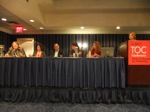 Moderated by: Kassia Krozser (Booksquare.com) Panelists: Lori James (All Romance/OmniLit/ARe Cafe), Jenn Northington (WORD), Kevin Smokler (Booktour.com), Jessica Stockton-Bagnulo (Greenlight Bookstore), Malle Vallik (Harlequin Enterprises Ltd)
Moderated by: Kassia Krozser (Booksquare.com) Panelists: Lori James (All Romance/OmniLit/ARe Cafe), Jenn Northington (WORD), Kevin Smokler (Booktour.com), Jessica Stockton-Bagnulo (Greenlight Bookstore), Malle Vallik (Harlequin Enterprises Ltd)
James: a bookseller sells books, not widgets. Devote a lot of time to consumer education. Booksellers don’t think about how to teach people to ebooks. Should have a knowledgeable customer service support staff. Requires a specialized set of skills and probably need to do it 24/7. Some customers actually need to do desktop sharing to figure it out. Is primarily on line and most community endeavors on line as well. Show up at some events. Do online contests, a twice a week newsletter (63K subscriber), did a writing contest and let community vote on them – go tons of traffic. Looking for a way to bring members together on a specific dedicated site which is separate from the ecommerce site. All Romance books only sells digital books. At time opened door Amazon was not selling digital books and so they were trying to appeal to a niche market in the digital space. The model has be very successful for them. Not trying to compete directly for the same market.
Northington: for a bookseller books are their livelihood. When Google ebooks went live sold more ebooks in a day then sold in the previous year. Runs an indie bookstore. Google books are a good thing for them. More than half of the ebooks sold in December were from recommendations from their staff. System easy to use and no support issues. Try to build a community: started a basketball league and several hundred people participated. This creates a physical community. Have a rainy day giveaway every once in a while which will promote on Twitter but have to come in to get the free book. Started a book a month subscription program and people from all over the country signed up. Need to cover all the different spheres of community. They compete by not competing. Not even really in the same business as Amazon or Google.
Smokler: excited about Google ebooks because hoped to use to support local bookseller, but found that local booksellers didn’t know how to present it on the web to make it easy to find. Google sticker should be prominent on the bookseller’s home page, if not there will probably loose the sale. There’s a lot you have to provide for free to bring people in and this works very well. Anyone who owns a physical space who sells books you have to determine what is unique about your physical space and the fact that it sells books is not what is unique. Curated selection, community features etc. are what make the difference. What are your unique assets? What is special about yout? and this is what consumers are asking about you. If are a small bookseller you can know your customers in a way that a large bookseller can’t. But you have to collect data on them. This may not build sales directly but will put you in a position that will eventually lead to sales. Look at customers Facebook account, for example, check their digital trail and make use of it it. You can use data to create familiarity with your customers. Most indie bookstores are in vibrant retail communities, but astonished about how few of them work together with the other local independent merchants to promote each other. As to Espresso Book Machine his understanding is that it needs to get smaller, cheaper and a bigger catalog. When this happens it will be very big.
Stockton-Bagnulo: a bookseller is someone who curates and creates community. Figure out what works for their audience. Runs a community bookstore. A learning cure with Google books and independent booksellers and some reluctant to try it out. They are doing very different things than Amazon. We can offer things that Amazon can’t – such as a book signing. You go to a bookstore not just to buy a book, but for different things. Borders demise make market more diverse, publishers may have to start pitching to more and different types of stores. Authors should have links to IndieBound on their site as well as to Amazon, etc.
Vallik: Customer service is incredibly important as is educating the consumer. Still at an evangelizing and teaching phase. Need to make things simple. Once a user has done it once and it worked the user will understand it. Works for Harlequin. The publishers’ responsibilities: makes all of your book available in digital editions and simultaneous to print, or consumer will get the ebook “another way”. Prices should be reasonable and if they are the consumer will buy it. Most readers used to the idea of paying for books and like the idea of supporting an author. Publishers owe booksellers fantastically complete and accurate metadata. They make podcasts, videos, extra stories, etc. that booksellers can be given to enhance their sales and this is not being taken fully advantage of. Had a community at Harlequin since mid 1990s. What’s unique is that a lot of community is authors and is a safe place for people to talk about romance novels – won’t be laughed at.
Krozser:































